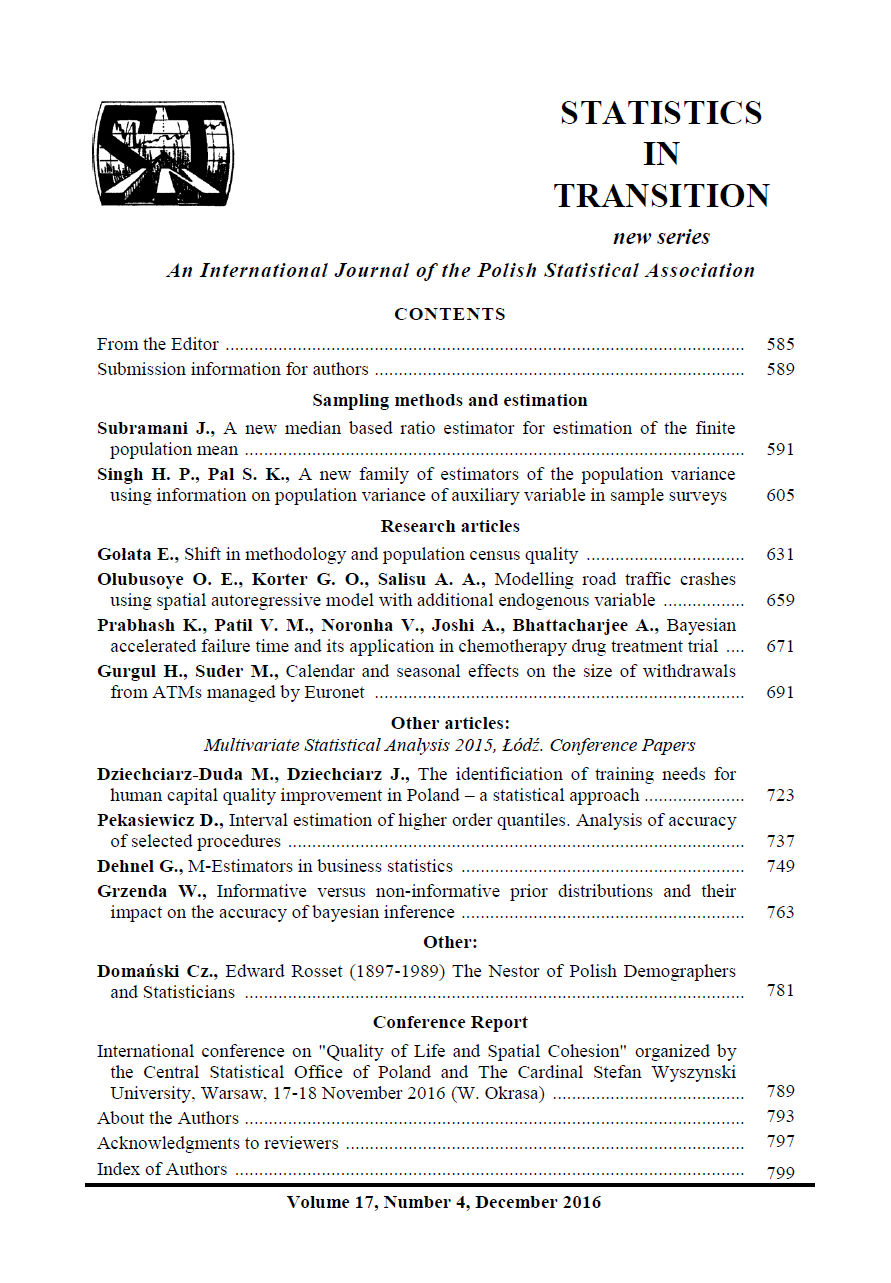ARTICLE
ABSTRACT
The Ministry of Science and Higher Education has launched the Competency Development Programme in the form of additional financial means for activities to equip students with unique, the so-called soft skills necessary in scientific careers and on the labour market. Courses developing skills such as team work ability, leadership, creativity, independent thinking and innovative approach to problem solving will be financed. For that purpose, a thorough analysis of needs is necessary. Existing databases describing the quality of human capital in Poland should be analysed in order to identify those competencies that graduates of universities are missing. The arsenal of possible statistical tools applicable for that purpose covers a wide range of techniques, from the simplest methods of descriptive statistics to advanced multivariate statistical analysis. The study will attempt to identify the missing soft competences based on existing statistical data, e.g. Polish human capital database.
KEYWORDS
soft competencies, human capital, statistical methods.
REFERENCES
BERNAIS, J., JĘDRALSKA, K., (eds.), (2015). Uniwersytet w perspektywie kształcenia przez całe życie [University in the Lifelong Learning Perspective].UE Katowice.
BILANS KAPITAŁU LUDZKIEGO [HUMAN CAPITAL BALANCE], (2014).PARP, Warszawa; http://bkl.parp.gov.pl.
BORG I., GROENEN P., (2005). Modern multidimensional scaling. Theory and applications. Springer, New York.
DZIECHCIARZ, J., (2012). System jakości kształcenia [The Quality of Educa tion], in: Dziechciarz, J., Błaczkowska A., Grześkowiak, A., Król, A., Stani mir, A., Analiza wybranych aspektów wyników egzaminu gimnazjalnego [Analysis of selected aspects of lower secondary school exam results], UE Wrocław.
DZIECHCIARZ, J., (2015). Pomiar i wycena wiedzy, umiejętności i kompetencji nabytych w formalnych i nieformalnych formach kształcenia [Measurement and Valuation of Knowledge, Skills and Competence Acquired in the Formal and Infor mal Education Forms], in: Wdowiński, P., (ed.), Nauczyciel akademicki wobec nowych wyzwań edukacyjnych [Academic Teacher’s new Educational Chal lenges], Uniwersytet Łódzki. pp. 25–43.
DZIECHCIARZ, J., (2015). Measurement of Rate of Return in Education. Re search Directions, in: Velencei, J., (ed.), Business, Management and Econom ics, Obuda University, Budapest, pp. 39–56.
DZIECHCIARZ, J., (2015). O pojęciu jakości w pomiarze efektów pracy uniwer sytetu [The Concept of Quality in the Measurement of the University Perfor mance], Ekonometria, No. 4, pp. 79–92.
DZIECHCIARZ, J., (2015). O pomiarze efektywności nakładów na edukację i szkolenia w kontekście kształcenia przez całe życie [On the Measurement of the Efficiency of Investment in Education and Training in the Context of Life long Learning], in: Bernais, J., Jędralska, K., (eds.), Uniwersytet w perspek tywie kształcenia przez całe życie [University in the Lifelong Learning Per spective], UE Katowice, pp. 42–52.
DZIECHCIARZ, J., BŁACZKOWSKA, A., GRZEŚKOWIAK, A., (2009). Econ ometric Evaluation of Education Systems; in: Rinderu, P., (ed.), Creating an Observatory on Europe-wide Transparency of Academic Qualifications, Edi tura Universitaria Craiova; Craiova, pp. 112–131.
DZIECHCIARZ, J., DZIECHCIARZ–DUDA, M., KRÓL, A., TARGASZEWSKA, M., (2015). Various Approaches to Measuring Effectiveness of Tertiary Edu cation, Archives of Datascience, 2015/1, pp. 1–25.
DZIECHCIARZ, J., et al. (eds.), (2006). Rynek pracy aglomeracji wrocławskiej. Stan i perspektywy [The Labour Market of the Wroclaw Agglomeration. Sta tus and Prospects], AE Wrocław.
DZIECHCIARZ–DUDA, M., DZIECHCIARZ, J., (2016). Multivariate Statistical Analysis in Missing Skills Identification, in: Michelberger, P., (ed.), Man agement, Enterprise and Benchmarking in the 21st Century, Óbuda University, Budapest, pp. 109–122.
DZIECHCIARZ–DUDA, M., KRÓL, A., (2012). Próba zastosowania modelu Mincera do oceny wpływu wyższego wykształcenia na poziom wynagrodzeń [An Application of Mincer Model in the Analysis of Higher Education Influ ence on the Wages’ Level], Ekonometria, No. 3 (37), pp. 56–69.
DZIECHCIARZ–DUDA, M., KRÓL, A., (2013). On the non-monetary benefits of tertiary education, Econometrics, No. 3 (41), pp. 78–94.
DZIECHCIARZ–DUDA, M., PRZYBYSZ, K., (2011). Rynek usług edukacyj nych dla osób starszych. Analiza cech studentów uniwersytetów trzeciego wieku [Educational Market for Elderly People – Analysis of University of the Third Age Students’ Characteristics], in: Garczarczyk, J., (ed.) Metody pomiaru i analizy rynku usług. Pomiar jakościowy. Zastosowania i efektywność [The Meth ods of Measurement and Analysis of Services Market. Qualitative Measure ment. Application and Effectiveness], UE Poznań, pp. 44–55.
DZIECHCIARZ–DUDA, M., PRZYBYSZ, K., (2014). Wykształcenie a potrzeby rynku pracy. Klasyfikacja absolwentów wyższych uczelni [Education and La bour Market Needs. Classification of University Graduates], in: Jajuga, K., Walesiak, M., (eds.), Taksonomia, No. 22/327, pp. 303–312.
Getting Youth in the Door: Defining Soft Skills Requirements for Entry-level Service Sector Jobs (2013). International Youth Foundation, Baltimore.
GÓRNIAK, J., (ed.) (2015). (Nie)wykorzystany potencjał. Szanse i bariery na polskim rynku pracy [Opportunities and Barriers on the Polish Labour Mar ket. (Not)Exploited Potential], PARP, Warszawa.
GREENACRE, M., (1984). Theory and Applications of Correspondence Analysis,Academic Press, London.
KURKLIŃSKI, L., MASZYBROCKI, M., (2008). Ocena kształcenia absolwen tów studiów o kierunku ekonomia oraz finanse i rachunkowość a potrzeby re krutacyjne instytucji finansowych [Economics, Finance and Accounting
Graduates Qualification Evaluation versus Financial Institutions Recruitment Needs], Związek Banków Polskich, Warszawa.
MASZYBROCKI, M., (2010). Praktyki w bankach i zakładach ubezpieczeń dla studentów kierunków ekonomicznych (wyniki badań ankietowych) [Intern ships in Banks and Insurance Companies for Business Students (Survey Re sults)], Wiadomości Ubezpieczeniowe 1/2010, pp. 139–148.
ROUSSEEUW, P., STRUYF, A., HUBERT, M., (2015). Package 'Cluster', https://cran.r–project.org/web/packages/cluster.
STANIMIR, A., (2005). Analiza korespondencji jako narzędzie do badania zja wisk ekonomicznych [Correspondence Analysis as a Tool for the Economic Phenomena Investigation], AE Wrocław.
The Ten Unique Soft Skills Employers Desire in new Hires, (2015).http://www.entrepreneur.com/article/234864.
WALESIAK, M., DUDEK, A., (2009). Ocena wybranych procedur analizy sku pień dla danych porządkowych [Finding Groups in Ordinal Data. An Exami nation of some Clustering Procedures], in: Jajuga, K., Walesiak, M. (eds.), Taksonomia, No. 16, pp. 41–49.
WALESIAK, M., DUDEK, A., (2015). Package 'ClusterSim', https://cran.r–project.org/web/packages/clusterSim.
WALESIAK, M., GATNAR, E., (eds.), (2009). Statystyczna analiza danych z wykorzystaniem programu R [Statistical Data Analysis using the Pro gram R], PWN, Warszawa.WDOWIŃSKI, P., (ed.) (2015). Nauczyciel akademicki wobec nowych wyzwań edukacyjnych [Academic Teacher’s new Educational Challenges]; Uniwersy tet Łódzki.
WHY ATTITUDE IS MORE IMPORTANT THAN INTELLIGENCE, (2015).http://www.entrepreneur.com/article/253095
ZABORSKI, A., PEŁKA, M., (2013). Geometrical presentation of preferences by using profit analysis and R program, Folia Oeconomica, 285, pp. 191–197.
